Reportback: Anti-Racism March
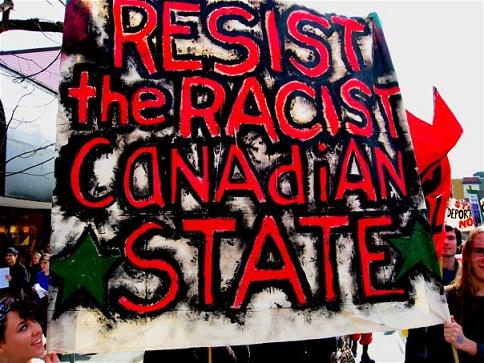 On March 21st, between 300-400 people including elders and children marched through unceded Coast Salish Territory to oppose racism. March 21 is the International Day for the Elimination of Racism and is commemorated every year as the anniversary of the 1960 Sharpeville Massacre in South Africa when police opened fire on hundreds of South Africans protesting against Apartheid’s passbook laws, killing at least 67 and wounding 186. The march honoured communities of colour that have led countless courageous struggles against racism and although many would like to believe that racism no longer exists, the march reclaimed the tradition of anti-racist marches to reveal the ugly truth about the worsening reality of racism both locally and globally.
On March 21st, between 300-400 people including elders and children marched through unceded Coast Salish Territory to oppose racism. March 21 is the International Day for the Elimination of Racism and is commemorated every year as the anniversary of the 1960 Sharpeville Massacre in South Africa when police opened fire on hundreds of South Africans protesting against Apartheid’s passbook laws, killing at least 67 and wounding 186. The march honoured communities of colour that have led countless courageous struggles against racism and although many would like to believe that racism no longer exists, the march reclaimed the tradition of anti-racist marches to reveal the ugly truth about the worsening reality of racism both locally and globally.
Under the slogan of “Canadian multiculturalism is not enough†the march was organized around five core demands:
– End individual and institutional racism, racial violence, and racial profiling! Racism manifests itself in our daily lives in a variety of way and through several critical realities: overt racial hate crimes and hate remarks; institutional racism embedded in policy decisions, public bodies such as the police, justice system, educational system, health care system, child and family services, and all levels of government; as well as a general overall system of white supremacy that constantly values whiteness as more superior and valuable.
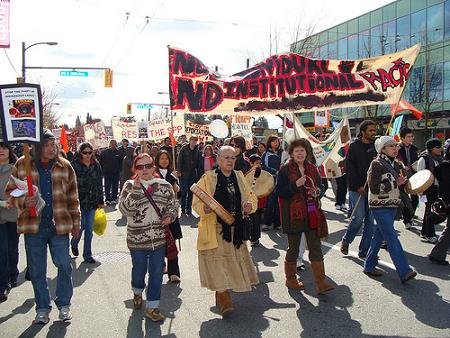 – Stop the theft of indigenous lands! There can be denial of the fact that Canada is built on stolen native land. This reality of colonial conquest and genocide has led to massive dispossession of traditional territories, lack of autonomy and self-determination, and annihilation of Indigenous peoples cultures and traditions. Conceived under the nineteenth century’s racist assumptions about the inferiority of Indigenous people and an assimilationist approach to the ‘Indian question’, this racist and colonial legacy has had serious effects: the introduction of and over-representation within the criminal system; breakup of families and communities through high child apprehension rates; the introduction and increased use of alcohol and drugs; lack of employment; low education levels; low income levels; substandard housing; and chronic physical and mental health. Almost 60% of Indigenous people in Canada now live in urban settings with the erosion of the land base of Indigenous communities. The vast majority of Aboriginal women – 72% – now live in non-reserve communities, most in urban areas and in the past twenty years, more than five hundred Indigenous women have been murdered or gone missing.
– Stop the theft of indigenous lands! There can be denial of the fact that Canada is built on stolen native land. This reality of colonial conquest and genocide has led to massive dispossession of traditional territories, lack of autonomy and self-determination, and annihilation of Indigenous peoples cultures and traditions. Conceived under the nineteenth century’s racist assumptions about the inferiority of Indigenous people and an assimilationist approach to the ‘Indian question’, this racist and colonial legacy has had serious effects: the introduction of and over-representation within the criminal system; breakup of families and communities through high child apprehension rates; the introduction and increased use of alcohol and drugs; lack of employment; low education levels; low income levels; substandard housing; and chronic physical and mental health. Almost 60% of Indigenous people in Canada now live in urban settings with the erosion of the land base of Indigenous communities. The vast majority of Aboriginal women – 72% – now live in non-reserve communities, most in urban areas and in the past twenty years, more than five hundred Indigenous women have been murdered or gone missing.
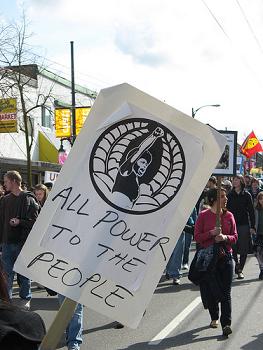 – End all racist wars and occupations! We have been wilfully ambivalent to the relentless violence that most of the world lives with as a daily companion. On the global stage, while the US is perceived as having been the sole hegemonic power over the past six decades, Canada has lent its support to interventions and occupations in Vietnam, East Timor, Afghanistan, Haiti, Palestine and Iraq. The current so-called fight against terrorism is a recent incarnation of a very old phenomenon of colonial crusading in defence of so-called Western civilization. The War on Terrorism, with its resulting occupations in Iraq and Afghanistan, are the most extreme forms of terrorism, making a war on terrorism profoundly self-contradictory. The occupations of Iraq, Afghanistan, and Palestine have devastated the lives of millions of people: hundreds of thousands dead, millions displaced, and even more starving. These are not simply humanitarian crises- these are deliberately manufactured political crises that employ military might on a daily basis, justified through racist dehumanization.
– End all racist wars and occupations! We have been wilfully ambivalent to the relentless violence that most of the world lives with as a daily companion. On the global stage, while the US is perceived as having been the sole hegemonic power over the past six decades, Canada has lent its support to interventions and occupations in Vietnam, East Timor, Afghanistan, Haiti, Palestine and Iraq. The current so-called fight against terrorism is a recent incarnation of a very old phenomenon of colonial crusading in defence of so-called Western civilization. The War on Terrorism, with its resulting occupations in Iraq and Afghanistan, are the most extreme forms of terrorism, making a war on terrorism profoundly self-contradictory. The occupations of Iraq, Afghanistan, and Palestine have devastated the lives of millions of people: hundreds of thousands dead, millions displaced, and even more starving. These are not simply humanitarian crises- these are deliberately manufactured political crises that employ military might on a daily basis, justified through racist dehumanization.
– Stop the deportations now! Tens of thousands of people are deported from Canada each year. Lack of status, deportations, detentions, and security certificates all contribute to making migrants vulnerable to exploitation, poverty, insecurity and indignities that no one should suffer. In the current political context, as Canada rushes to harmonize its border and national security policies with the United States to create a unified “Fortress North America”, the situation of immigrants and refugees is worsening. Meanwhile, the Canadian government supports international agreements such as NAFTA and the Security and Prosperity Partnership Agreement that allow the free movement of capital across the globe that has created huge areas of poverty around the world giving people no choice but to migrate. Meanwhile, many sectors of the Canadian economy rely on the exploited labour of migrant workers, non-status people and refugees, thus maintaining a social and economic system that has created two classes of people. They are forced underground; threatened with detention or with deportation; and subjected to discriminatory legal standards.
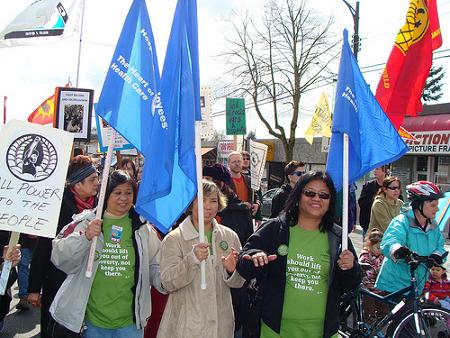 – Living wages, healthcare, education, and housing for all! It is important to understand the connection between race and poverty. Not only across the globe, but the reality is that those who predominantly live in poverty in Canada are indigenous and recent immigrant communities. This is not just a coincidence, this is a systemic reality. In Canada, people of colour are three to four times more likely to be poor due to racist and sexist structuring of the economy and capitalist globalization. This is part of the trend of neo-liberalism: where we see losses in stable and unionized jobs through processes of privatization; increased reliance on part-time, casual, and temporary labour especially temporary migrant workers who have no rights in this country; and decreases in critical social services such as housing, childcare, and welfare.
– Living wages, healthcare, education, and housing for all! It is important to understand the connection between race and poverty. Not only across the globe, but the reality is that those who predominantly live in poverty in Canada are indigenous and recent immigrant communities. This is not just a coincidence, this is a systemic reality. In Canada, people of colour are three to four times more likely to be poor due to racist and sexist structuring of the economy and capitalist globalization. This is part of the trend of neo-liberalism: where we see losses in stable and unionized jobs through processes of privatization; increased reliance on part-time, casual, and temporary labour especially temporary migrant workers who have no rights in this country; and decreases in critical social services such as housing, childcare, and welfare.
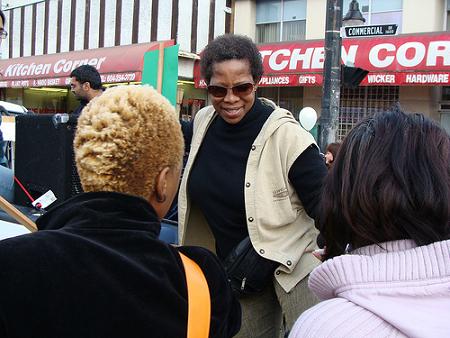 The march was opened by elders from the DTES Elders Council and the Indigenous Action Movement. Speakers during the march included Reem Alnuweri, a long time Palestinian organizer with Al-Awda Network, talking about the racism embedded in the ongoing War on Terror and the occupations of the Middle East; Dustin Rivers, Skwxwú7mesh youth, speaking about the ongoing theft, colonization, and devastation of indigenous lands and peoples; Avelina Vasquez, Aramark worker with the Living Wage Campaign, describing her personal experiences as a low-wage worker in the service industry and the increasing privatization of the labour market; Sumayya Kassimalli, with No One Is Illegal-Toronto, talking about the expanding national security apparatus; Yuly Chan on the poor health conditions of poor and working people of colour as a direct result of neoliberal and imperalist policies around the world; Carl, with the Filipino Canadian Youth Alliance, describing the systemic marginalization of Filipino Youth due to an intergenerational legacy of the exploitative live-in caregiver program; Gladys Radeck, organizer with Highway of Tears, passionately describing the painful reality of the hundreds of murdered and missing Indigenous women; and Anne Marie Aboutali, a South African activist in the anti-apartheid struggle.
The march was opened by elders from the DTES Elders Council and the Indigenous Action Movement. Speakers during the march included Reem Alnuweri, a long time Palestinian organizer with Al-Awda Network, talking about the racism embedded in the ongoing War on Terror and the occupations of the Middle East; Dustin Rivers, Skwxwú7mesh youth, speaking about the ongoing theft, colonization, and devastation of indigenous lands and peoples; Avelina Vasquez, Aramark worker with the Living Wage Campaign, describing her personal experiences as a low-wage worker in the service industry and the increasing privatization of the labour market; Sumayya Kassimalli, with No One Is Illegal-Toronto, talking about the expanding national security apparatus; Yuly Chan on the poor health conditions of poor and working people of colour as a direct result of neoliberal and imperalist policies around the world; Carl, with the Filipino Canadian Youth Alliance, describing the systemic marginalization of Filipino Youth due to an intergenerational legacy of the exploitative live-in caregiver program; Gladys Radeck, organizer with Highway of Tears, passionately describing the painful reality of the hundreds of murdered and missing Indigenous women; and Anne Marie Aboutali, a South African activist in the anti-apartheid struggle.
 The march also featured a number of dynamic community performers including the Downtown Eastside Women Centre Taiko Drumming group; amazing spoken word artist Hari Alluri; the poetry of Al Noor Gova of Siraat Muslim Artists Collective; Najeeb Joya, an Afghani singer; and revolutionary Nepali songs by Abi Ghimire. Chants throughout the march included “People of colour under attack, what do we? Stand up, fight backâ€, “No Olympics on Stolen Native Landâ€, “Free free palestineâ€, “Justice for immigrants, freedom for refugees†and “Stop the imperialist war machine, From Colombia to the Phillipinesâ€
The march also featured a number of dynamic community performers including the Downtown Eastside Women Centre Taiko Drumming group; amazing spoken word artist Hari Alluri; the poetry of Al Noor Gova of Siraat Muslim Artists Collective; Najeeb Joya, an Afghani singer; and revolutionary Nepali songs by Abi Ghimire. Chants throughout the march included “People of colour under attack, what do we? Stand up, fight backâ€, “No Olympics on Stolen Native Landâ€, “Free free palestineâ€, “Justice for immigrants, freedom for refugees†and “Stop the imperialist war machine, From Colombia to the Phillipinesâ€
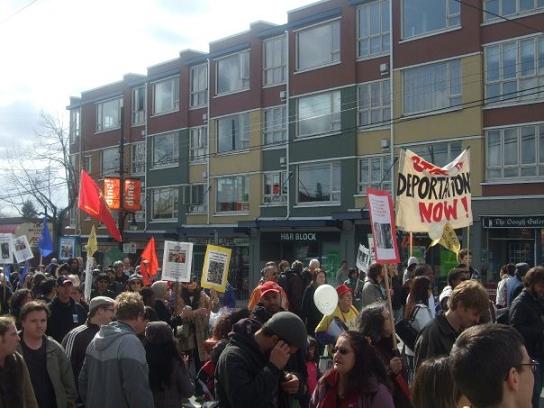 The march was supported by an incredible community network of organizations: No One Is Illegal, Indigenous Action Movement, Komagata Maru Heritage Foundation, Canadian Arab Federation, John Graham Support, Siraat Collective, Association of Chinese Canadians for Equality and Solidarity Society, DTES Elders Council, SIKLAB – Overseas Filipino Workers Organization, Anniversaries of Change, International Indigenous Youth Conference Secretariat, Canadian Muslim Union, Jews for Just Peace, Asian Society for the Intervention of AIDS, Justicia for Migrant Workers, Al-Awda Vancouver, Greater Vancouver Japanese Canadian Citizens Association, Salaam Vancouver, Iranian Federation of Refugees, Cafe Rebelde Coalition, VIRSA, Latin American Connexions, Hogans Alley Memorial Project, Filipino Nurses Support Group, La Surda Latin American Collective, Indigenous Free School, Communities for Laibar Singh-Vancouver, Canadian Network for Democratic Nepal, Canada Palestine Association, Group of Relatives and Friends of Political Prisoners in Mexico, South Asian Network for Secularism and Democracy, Council of Indigenous Nations of Oaxaca (CIPO-Vancouver), Chetna Dalit Association, Philippine Women Centre of BC, Coalition of South Asian Women Against Violence, Vancouver Status of Women, The North Shore Women’s Centre, Battered Women
The march was supported by an incredible community network of organizations: No One Is Illegal, Indigenous Action Movement, Komagata Maru Heritage Foundation, Canadian Arab Federation, John Graham Support, Siraat Collective, Association of Chinese Canadians for Equality and Solidarity Society, DTES Elders Council, SIKLAB – Overseas Filipino Workers Organization, Anniversaries of Change, International Indigenous Youth Conference Secretariat, Canadian Muslim Union, Jews for Just Peace, Asian Society for the Intervention of AIDS, Justicia for Migrant Workers, Al-Awda Vancouver, Greater Vancouver Japanese Canadian Citizens Association, Salaam Vancouver, Iranian Federation of Refugees, Cafe Rebelde Coalition, VIRSA, Latin American Connexions, Hogans Alley Memorial Project, Filipino Nurses Support Group, La Surda Latin American Collective, Indigenous Free School, Communities for Laibar Singh-Vancouver, Canadian Network for Democratic Nepal, Canada Palestine Association, Group of Relatives and Friends of Political Prisoners in Mexico, South Asian Network for Secularism and Democracy, Council of Indigenous Nations of Oaxaca (CIPO-Vancouver), Chetna Dalit Association, Philippine Women Centre of BC, Coalition of South Asian Women Against Violence, Vancouver Status of Women, The North Shore Women’s Centre, Battered Women  Support Services, Friends of Women in the Middle East Society, Women Against Violence Against Women, Grassroots Women, Women’s International League for Peace and Justice, Vancouver Feminist Action Project, Canadian Union of Postal Workers, BC Teachers Federation, Hospital Employees Union, Industrial Workers of the World, SFU Teaching Support Staff Union, Vancouver District Labour Council, Canadian Union of Public Employees – Local 1004 and Local 15, Gallery Gachet, Rhizome Cafe, New World Theatre, Colouring Book Project, UBC Realities of Race, Carnegie Community Action Project, SFU Public Interest Research Group, BC Committee for Human Rights in the Philippines, StopWar.ca, Anti Poverty Committee, Politics Re-Spun, Building Bridges to Chiapas, Alliance of People’s Health, International Solidarity Movement Vancouver, SFU Interfaith Summer Institute Community Consultative Committee, Vancouver District Labour Council Young Workers Committee, Filipino-Canadian Youth Alliance, UBC Students for a Democratic Society, Solidarity Notes Labour Choir, Random Acts of Kindness, Anti-Racism & Decolonization Network, Miscellaneous Productions
Support Services, Friends of Women in the Middle East Society, Women Against Violence Against Women, Grassroots Women, Women’s International League for Peace and Justice, Vancouver Feminist Action Project, Canadian Union of Postal Workers, BC Teachers Federation, Hospital Employees Union, Industrial Workers of the World, SFU Teaching Support Staff Union, Vancouver District Labour Council, Canadian Union of Public Employees – Local 1004 and Local 15, Gallery Gachet, Rhizome Cafe, New World Theatre, Colouring Book Project, UBC Realities of Race, Carnegie Community Action Project, SFU Public Interest Research Group, BC Committee for Human Rights in the Philippines, StopWar.ca, Anti Poverty Committee, Politics Re-Spun, Building Bridges to Chiapas, Alliance of People’s Health, International Solidarity Movement Vancouver, SFU Interfaith Summer Institute Community Consultative Committee, Vancouver District Labour Council Young Workers Committee, Filipino-Canadian Youth Alliance, UBC Students for a Democratic Society, Solidarity Notes Labour Choir, Random Acts of Kindness, Anti-Racism & Decolonization Network, Miscellaneous Productions
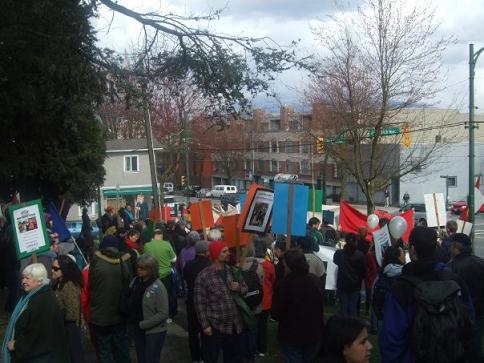 The struggle against racism must continue beyond March 21. This march was simply one manifestation of a larger ongoing movement for justice and self-determination for communities of colour as we resist the ravages of exploitation, systematic exclusion, and marginalization through our daily struggles.
The struggle against racism must continue beyond March 21. This march was simply one manifestation of a larger ongoing movement for justice and self-determination for communities of colour as we resist the ravages of exploitation, systematic exclusion, and marginalization through our daily struggles.



